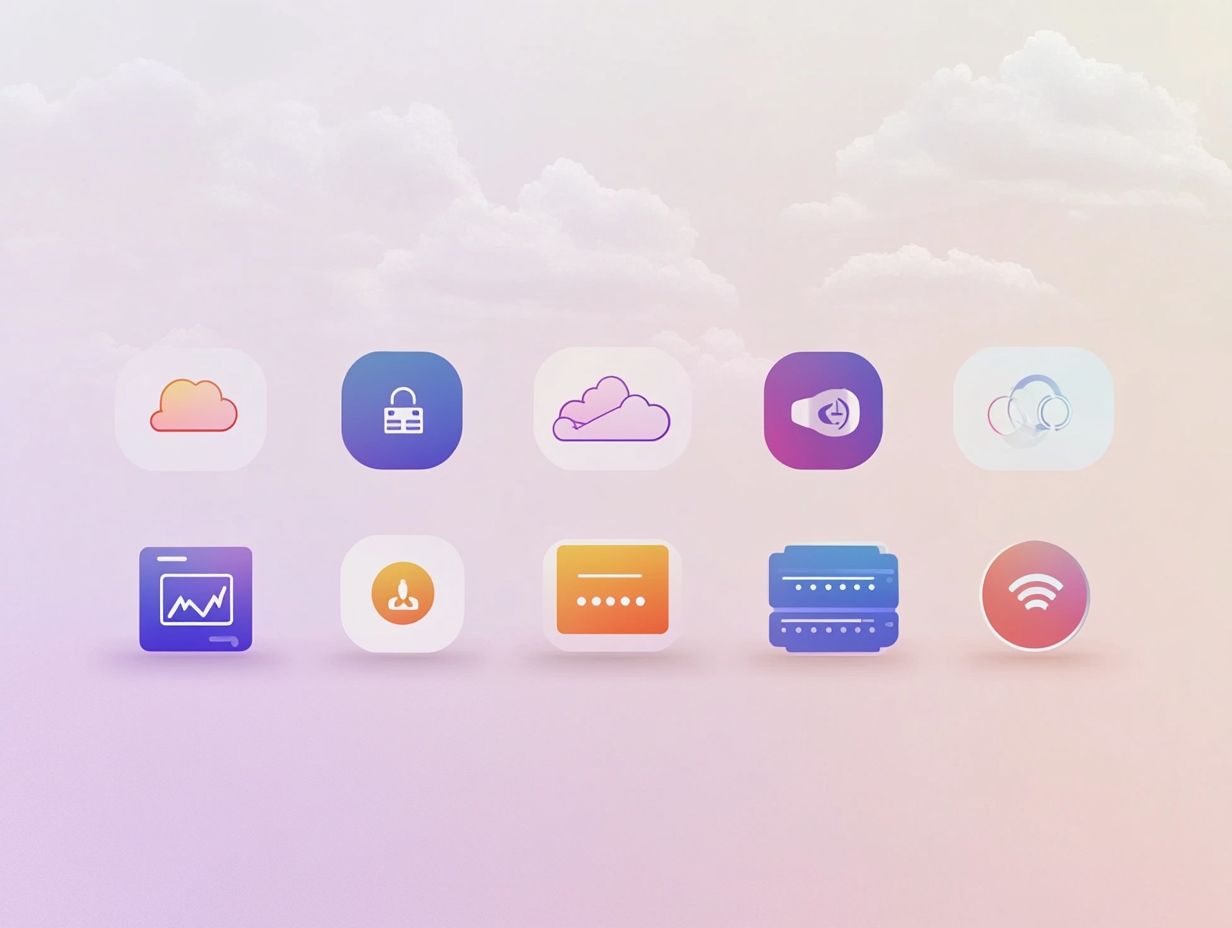5 Affordable Cloud Storage Options for Startups
In today s digital landscape, you need reliable and affordable cloud storage solutions to keep your data secure while fostering seamless collaboration.
With a multitude of options at your fingertips, selecting the right service can feel overwhelming. This article delves into five standout cloud storage solutions: Google Drive, Dropbox, Microsoft OneDrive, Box, and iCloud.
You ll find a comparison of their key features, free storage offerings, paid plans, security measures, and collaboration capabilities. We ll also help you find the best option for your startup’s budget.
Stay tuned to find out which cloud storage solution could be your business’s new best friend!
Contents
- Key Takeaways:
- 1. Google Drive
- 2. Dropbox
- 3. Microsoft OneDrive
- 4. Box
- 5. iCloud
- What Are the Key Features of Each Cloud Storage Option?
- Frequently Asked Questions
- 1. What are the benefits of using cloud storage for startups?
- 2. What is the price range for cloud storage options for startups?
- 3. How much storage do these affordable cloud storage options offer?
- 4. What features come with these affordable cloud storage options?
- 5. Can I upgrade my storage or features as my startup grows?
- 6. What customer support options are available?
Key Takeaways:

Google Drive offers 15GB of free storage, with paid plans starting at $1.99/month for 100GB. It has strong collaboration and sharing capabilities, making it a great option for startups exploring the top cloud providers.
Dropbox offers 2GB of free storage, with paid plans starting at $9.99/month for 2TB. It has strong security features and integrates well with other apps, making it a popular choice for startups looking for cloud storage options for photographers.
Microsoft OneDrive offers 5GB of free storage, with paid plans starting at $1.99/month for 100GB. It has solid security features and easy integration with Microsoft Office, making it ideal for startups. For those looking for more options, check out the 5 best cloud storage options for remote teams.
1. Google Drive
Google Drive stands out as a premier cloud storage solution, enabling small businesses to effortlessly access, manage, and share their data while prioritizing user experience and data security.
With its powerful file-sharing features, you can easily grant access to team members or clients, making project collaboration efficient and intuitive.
The built-in collaboration tools, such as comments and real-time editing, elevate teamwork by enabling multiple users to work on documents simultaneously. This significantly boosts your productivity.
Its easy integration with other cloud applications, like Google Workspace, allows for a cohesive workflow, streamlining your communications, tasks, and data management processes.
For small businesses aiming to optimize their operations, leveraging this platform can yield cost savings, simplify organization, and enhance data accessibility. Ultimately, this propels your growth and efficiency.
2. Dropbox
Dropbox serves as a powerful cloud storage solution tailored to enhance collaboration within your small business while offering reliable data privacy features that protect your sensitive information.
Its user-friendly interface simplifies file sharing, allowing your team to exchange documents effortlessly in real-time.
The platform boasts excellent collaboration tools that enable multiple users to work on the same file simultaneously, promoting a seamless workflow that keeps everyone in sync.
Security takes precedence, with features like end-to-end encryption and comprehensive access controls ensuring that only authorized personnel can access sensitive data.
Dropbox is designed with small businesses in mind, providing scalable user accounts that make it easy to add or remove team members as your business evolves. This ensures it adapts alongside your unique requirements.
3. Microsoft OneDrive
Microsoft OneDrive presents a sophisticated cloud storage solution that easily integrates with your corporate network, providing efficient data backup and management tailored for small businesses.
By enabling seamless collaboration across various Microsoft Office applications, you can create, edit, and share documents directly from OneDrive.
This integration allows your team to work in harmony, whether drafting a presentation in PowerPoint or collaborating on an Excel spreadsheet.
With robust data security features like encryption and features that identify potential security issues, OneDrive safeguards your sensitive information.
For small businesses, these capabilities streamline workflow automation by centralizing file storage, simplifying access, and facilitating automated sharing and syncing.
This not only enhances productivity but also mitigates the risk of data loss, allowing you to focus on what truly matters.
Take the leap towards streamlined storage today!
4. Box

Box is a cloud storage platform known for its strong security measures, making it the perfect choice for small businesses eager to protect their data and allow remote access for their teams.
The platform s strong encryption safeguards your data both at rest and in transit, giving you peace of mind as you handle sensitive information.
With Box s advanced permissions feature, you can customize access levels, ensuring that only authorized personnel can view or edit critical documents. This control over user permissions allows you to define specific roles within your teams, minimizing the risk of data breaches.
For small businesses that prioritize confidentiality, these features boost security and streamline your workflow. This makes working together easier and more enjoyable!
5. iCloud
Apple’s iCloud stands out as a premier cloud storage solution for small businesses, offering a user-friendly data transfer experience and competitive pricing plans tailored to your needs.
With seamless integration across all your Apple devices iPhones, iPads, and Macs you can access and manage your data from virtually anywhere. The platform offers various storage tiers, starting at a reasonable monthly fee, allowing you to choose a plan that fits your budget and business size.
iCloud simplifies document sharing and collaboration while ensuring your data’s security with strong encryption measures. Its intuitive interface makes it easy to organize files and back up important information.
This ultimately enhances your productivity and streamlines data management for your growing enterprise.
What Are the Key Features of Each Cloud Storage Option?
Each cloud storage option whether it s Google Drive, Dropbox, Microsoft OneDrive, Box, or iCloud has unique features tailored to your business needs. It’s crucial to evaluate each closely to find the best fit.
These platforms offer various storage capacities to accommodate your small business s evolving demands. Collaboration tools are vital, enabling your teams to work together seamlessly, no matter where they are.
Data security measures can differ significantly. Some options provide advanced encryption and adhere to industry standards, ensuring your sensitive information remains safe.
Don’t overlook user experience; an intuitive interface can greatly enhance productivity, making it easier for your teams to adopt and integrate the solution into their daily workflows.
How Much Storage Do These Options Offer for Free?
Understanding the amount of free storage offered by each provider is essential for you as a small business owner seeking cost-effective data management solutions.
By comparing these options, you can determine which platform aligns with your needs, enabling efficient collaboration and streamlined file sharing.
- Google Drive: 15 GB of free storage, usable across various applications like Google Docs and Sheets.
- Dropbox: 2 GB of free storage, focusing on effortless file sharing.
- Microsoft OneDrive: 5 GB of free storage, with seamless integration in the Office suite, beneficial if your team uses Word or Excel.
- Box: 10 GB of free storage, emphasizing security features for businesses handling sensitive information.
- iCloud: 5 GB of free storage, designed for Apple users, ensuring smooth synchronization across devices.
Evaluate these free storage options now to avoid limitations later and select a service that truly fits your operational demands!
What Are the Paid Plans and Pricing for Each Option?

The pricing plans for cloud storage options like Google Drive, Dropbox, Microsoft OneDrive, Box, and iCloud can vary a lot. It s crucial to analyze which plan fits your budget and storage needs.
By checking the unique features each plan offers, you can find solutions that meet your specific requirements.
For example, Google Drive starts with a free tier, and its paid plans include enhanced collaborative tools, which are great for teams that enjoy real-time editing.
Dropbox bases its pricing on storage capacity and team functionality, making it attractive for medium-sized businesses needing effective file-sharing capabilities.
If you’re already using Microsoft products, Microsoft OneDrive works seamlessly with the Office suite, making it a great choice.
Box focuses on strong security features, which are ideal for handling sensitive data.
iCloud’s pricing mainly targets personal users but can also serve small teams seeking straightforward storage options.
How Secure Are These Cloud Storage Options?
Keeping your data safe is vital for your business. Understanding the security measures of platforms like Google Drive, Dropbox, Microsoft OneDrive, Box, and iCloud is crucial for protecting sensitive information.
These platforms offer various security features designed to safeguard your data. They typically use strong data protection for both data transmission and when the data is stored, keeping files unreadable to unauthorized users.
You can also customize user permissions, allowing you to control who can view or edit documents. This significantly reduces risks from insider threats.
It’s essential to follow regulations like GDPR and HIPAA, as these standards require higher measures for protecting personal and health-related data. Choosing a provider that complies with these regulations ensures your information is secure and helps you avoid legal complications.
What Are the Collaboration and Sharing Capabilities of Each Option?
Collaboration and sharing capabilities are key for small businesses. Platforms like Google Drive, Dropbox, Microsoft OneDrive, Box, and iCloud offer tools that enhance teamwork and project management.
These platforms also allow your team to collaborate in real time, promoting seamless communication and efficient workflows.
With Google Drive, multiple users can edit documents simultaneously, ensuring everyone stays on the same page. Dropbox makes it easy to send large files without any hassle.
When integrated with various productivity tools, these storage solutions provide even greater value, helping you streamline operations effectively.
Using these collaboration features, your small business can improve project management and foster a cohesive and productive working environment.
Which Option Is Best for Startups on a Tight Budget?
For startups on a tight budget, choosing the right cloud storage option can greatly impact your data management capabilities. Consider exploring cost-effective cloud storage solutions, as several providers offer affordable plans specifically designed for emerging businesses.
These options come with essential features like data encryption, easy file sharing, and collaboration tools, all of which help streamline your workflow without straining your finances.
Many services offer a tiered pricing structure, allowing you to scale as your needs grow. Free storage thresholds can further enhance value, helping you manage your finances while ensuring robust data security.
By carefully assessing your specific business needs such as storage limits and sharing capabilities you can find the best cloud storage solutions that align with your operational goals.
Frequently Asked Questions

1. What are the benefits of using cloud storage for startups?
Cloud storage enables startups to safely store and access data from anywhere. It’s cost-effective, scalable, and flexible, making it perfect for startups with limited resources. Exploring 5 cloud storage solutions for small businesses can help in selecting the right option.
2. What is the price range for cloud storage options for startups?
Prices for cloud storage can vary based on storage needs and features. Typically, affordable plans cost between $5 and $15 per user each month.
3. How much storage do these affordable cloud storage options offer?
Affordable cloud storage options usually provide between 5GB to 1TB per user. Some may even offer unlimited storage for an extra fee.
4. What features come with these affordable cloud storage options?
These options often include features like file sharing, collaboration tools, and automatic backups. Many also offer strong security measures to protect your data.
5. Can I upgrade my storage or features as my startup grows?
Yes! Most cloud storage services allow you to upgrade your storage or features easily as your startup expands. For more options, check out 5 user-friendly cloud storage services. This way, you only pay for what you need at any given time.
6. What customer support options are available?
Support options may differ by provider. Most offer online resources like FAQs and tutorials, plus email or live chat support. Some may charge extra for phone support.






